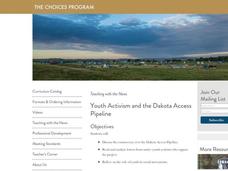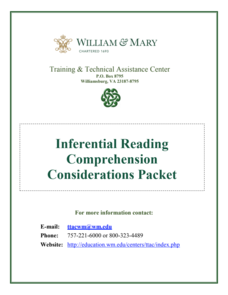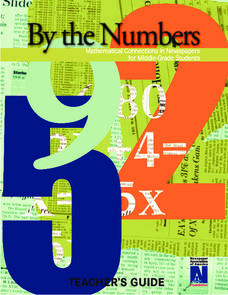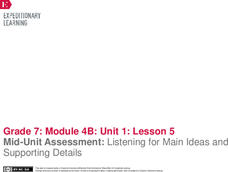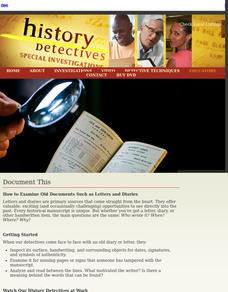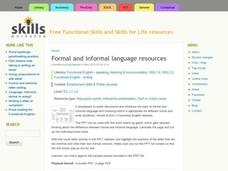Brown University
Youth Activism and the Dakota Access Pipeline
Do young people have a role in social movements? Should they? The involvement of young people in the Dakota Access Pipeline is the focus of a resource that asks class members to examine letters written by native youths who oppose the...
Channel Islands Film
Dark Water: Lesson Plan 3 - Grades 6-12
After watching the documentary Dark Water about a traditional Chumash ceremony and reading a Chumash origin story, viewers are asked to create a coat of arms and to craft an essay that details a family tradition or their own origin story.
Channel Islands Film
Island Cattle Ranching
Is cattle ranching on Santa Rosa island viable or non-viable? Rather than focusing on the issues of the transition of Santa Rosa island from a privately owned island cattle ranch to a national park, class members are asked to consider if...
Channel Islands Film
Arlington Springs Man: Lesson Plan 4
West of the West's documentary Arlington Springs Man introduces viewers to the remarkable finds on Santa Rosa Island. Archaeologist have discovered on this small island that is part of the Channel island chain, human and pygmy mammoth...
Channel Islands Film
Island Rotation: Lesson Plan 2
Why are Torrey pines only found in La Jolla, California and on Santa Rosa Island? Class members examine images of Torrey pines from these two locations, noting the similarities and differences, and then develop a demonstration model that...
PBS
Before We Travel, We Research
Context is key when it comes to historical research. Prior to field research, class members learn as much as they can about the site they are going to visit. Groups investigate and prepare presentations about the history of the site, the...
Smithsonian Institution
Dia de los Muertos: Honoring our Ancestors Through Community Celebration
Oral storytelling has been an important part of every culture. The time-honored practice uses stories as a conduit for a culture's values and customs from one generation to the next. Keep the tradition going with a family interview...
William & Mary
Inferential Reading Comprehension Considerations Packet
Don't forget to read between the lines! Educators learn tips and activities to help scholars learn to infer to increase reading comprehension. Activities suggested include think alouds, backwards words, and who's who. the packet includes...
British Council
William Shakespeare
After watching a three-minute video detailing the life of William Shakespeare, scholars take part in several activities designed to show what they know about the famous writer. Learners read a series of eight sentences and put them in...
Newspaper Association of America
By the Numbers: Mathematical Connections in Newspapers for Middle-Grade Students
A cross-curricular resource teaches and reinforces mathematical concepts with several activities that use parts of a newspaper. Scholars use scavenger hunts to find the different ways math is used in the paper along with using data...
EngageNY
Mid-Unit Assessment: Listening for Main Ideas and Supporting Details
Pay attention! Scholars view the video"Why College Students Should Start Paying Attention to Water" multiple times to complete a note catcher. After discussing their thoughts with the class, learners watch "The Water Crisis Isn’t...
EngageNY
Analyzing Main Ideas and Details: Why Care about Water?
Pay attention to details! After completing text-dependent questions about paragraphs 10-12 of "Water is Life," scholars view the video "Why Care about Water. "They view the video three times and use a Main Idea and Details note-catcher...
EngageNY
Clarifying Thinking on Water Management: Revisiting the Gallery Walk
One, two, three, go! Scholars gather in triads and number themselves one to three. Each number is responsible for sharing a section of the map homework completed the night before as learners discuss domain-specific vocabulary terms using...
PBS
Who Knows Best
Finding an expert in a given field when conducting research can be a challenge. This guide provides step-by-step directions as well as links to resources that help young sleuths find the authorities and experts they need. As a bonus, two...
PBS
Document This
Being a historian requires serious sleuthing. They examine primary source documents and look for evidence, for clues that reveal who wrote the document, when, and why. After watching two historians model the process, young history...
Tallahassee Community College
Finding the Main Idea
A short excerpt at the beginning of the sheet provides students with questions to think about when looking for the main idea. Followed by that, learners respond to four reading passages by answering multiple choice questions.
Curated OER
CCC: Credible sources, Creative Commons Images, and Citing Your Sources
As part of a unit devoted to the study of autobiographies, this one-day library session focuses on developing research skills. Class members locate and properly cite a sketch of a Creative Commons image, as well as record the call...
Nazareth College
Chronological Order
First, next, and last, the elements of chronological order. In every story or text one can find a series of events that occur one after the other. To help learners with visual impairments conceptualize chronological order, this lesson...
Austin Independent School District
Social Studies Strategies: Concept of a Definition Map
Model for your class members how to use a definition map to make connections between new words and prior knowledge. Although the strategy is designed for social studies classes, the approach can be use at any grade level and in any...
Polk Bros Foundation
Meet the Nonfiction Main Idea Challenge
Help your class develop the ability to determine a main idea with a packet of materials that you can introduce and use over a period of time. The packet includes some information for the teacher and rationale for the exercises. There are...
Teacher Printables
Photo Scrapbook
Have your class summarize a reading with drawings. This page provides six boxes shaped like photographs, each with small space for pupils to write a caption. A great way for students to process what they've read, use the resource for...
Curated OER
Formal and Informal Language Resources
Yo! Check it out. Here's a lesson on formal and informal language. And the packet includes a game. What fun!
Scholastic
Health Literacy and Drug Abuse
Students brainstorm about the different health issues facing teens today. In this health science lesson, students discuss the danger associated with drug abuse. They recommend ways to stay healthy.
Curated OER
Lattimer Massacre: What's Beneath the Surface?
Middle schoolers research the growth of unions due to issues related to the Lattimer Massacre. They research primary source documents and create posters, skits and role plays.
Other popular searches
- Topic Sentences
- Persuasive Writing Topics
- Demonstration Speech Topics
- Writing Topic Sentences
- Renaissance Topics
- Identifying Topic Sentences
- Brainstorming Topics
- Research Paper Topics
- Essay Writing Topics
- Aviation Topics
- Journal Topics
- Life Science Report Topic


